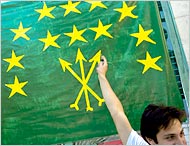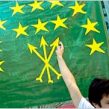
Moscow Forced to Give More Consideration to Circassian Demands
Publication: Eurasia Daily Monitor Volume: 7 Issue: 194
By:

A massive and bizarre counter-terrorist operation is underway in the mountains of Kabardino-Balkaria. On October 20, fighting between government forces and a group of armed insurgents broke out in the mining town of Tyrnyauz. A policeman and three rebels were killed in the clash, according to official sources (www.kavkaz-uzel.ru, October 20). Rebel sources claimed only one rebel was killed during the fighting (www.islamdin.com, October 21).
Following the clash, the insurgents hid in abandoned mines in the area. According to some estimates, the mines are up to 300 kilometers in combined length. Over 400 policemen were sent to try to block the insurgents, numbering around 10 people in the mines. A special counter-terrorist operation regime was introduced in the area in order to prevent the insurgents from escaping, while the search is expected to last for a few more days (www.kavkaz-uzel.ru, October 26).
This mountainous area of Kabardino-Balkaria is predominantly populated by the ethnic Balkars, a Turkic-speaking minority in the republic. Also it is in close proximity to Mount Elbrus, which is designated by the Russian government as a major tourism-development site in the North Caucasus.
As recently as one year ago, Kabardino-Balkaria had been one of the quietest republics in the North Caucasus. Since early spring 2010, however, the republic has been hit by a wave of attacks. According to Russian police statistics, of all the areas of the North Caucasus, Kabardino-Balkaria and Dagestan represent the two most active areas in the region Caucasus in terms of insurgent activity, while rebel attacks have been on the decline in Ingushetia and Chechnya. Police officials claim there are about 70 insurgent groups across the North Caucasus and that in the first nine months of 2010 alone, there were over 330 attacks carried out throughout the region (Interfax, October 21).
The insurgency in Kabardino-Balkaria has rapidly become a violent force in the republic, staging the first-ever attack in the North Caucasus on a hydroelectric plant in Baksan in July 2010. The surprise assault rendered the plant unusable and was projected to cost the Russian monopoly Rusgidro tens of millions of dollars in repairs. This action was among the first strong signals that Moscow’s plan to overhaul the economic life of the North Caucasus in order to quell the widening underground insurgency, was on the verge of collapse. On October 26, a spokesman for the Russian Investigative Committee stated that two men were arrested in connection with the sabotage. Law enforcement agencies had previously claimed that two other assailants had been killed (www.kavkaz-uzel.ru, October 26).
Government forces in Kabardino-Balkaria pursue largely the same tactics as those in the other North Caucasian republics, where the security situation has been precarious for a long time. These include deliberately and showy build-ups of forces around a negligible number of insurgents in order to send a certain message to the local population. The practice of “disappearing” people seems to also be on rise in the republic. On October 18, three men from the resort area around Mount Elbrus reportedly disappeared. On October 20, their relatives staged a protest and were subsequently reassured that the republican government would help them find the missing men (www.kavkaz-uzel.ru, October 21).
Kabardino-Balkaria (with a population of 900,000) is the largest republic of the North Caucasus in which Circassians (aka Kabardins, Cherkess, Adygs, Shapsugs) reside, and the only one in which they comprise a clear majority. The Circassians lay claim to the lands around Sochi on the Black Sea coast, where Moscow is going to hold the 2014 Winter Olympics. According to the Circassians’ narrative, which is supported by a plethora of historical facts, the sites of the 2014 Olympic Games were the same places where the Russian imperial army slaughtered hundreds of thousands of Circassians, decimating the indigenous population and deporting the majority of those who were not killed. Currently it is estimated that only about 10 percent of the original Circassian population live in their homeland, while the rest are scattered around the globe, mostly in Turkey, Jordan and Syria.
Circassian activists, realizing that they can make their people’s plight heard around the world because of the 2014 Olympic Games, quickly galvanized the diaspora as well as their brethren living in their homeland in the North Caucasus. Apparently eager to avoid a fiasco with the upcoming Olympics, Moscow seems to be slowly realizing that it needs to react to the challenge mounted by the upsurge in Circassian nationalism. Moscow cannot afford to use only heavy-handed methods, furthering Circassian claims that Russia used genocidal methods to change the ethnic make-up of the area. So Moscow is trying to reach out to the Circassian Diaspora, specifically in Turkey, and is considering other options to mollify deepening Circassian resentment.
On October 25, Circassian organizations in Turkey decided to form their own separate entities apart from other North Caucasian diaspora groups in the country (i.e., Abkhaz groups who support Russian backed independence for Abkhazia). With this development, their goal seems to facilitate their return to their historical homeland in the North Caucasus according to new Russian legislation that is expected to come into force in 2012. Asker Sokht, a Circassian representative from the Krasnodar region, attended this gathering to brief the Turkish Circassians on the Russian government position (www.ekhokavkaza.com, October 25). Sokht is known among the Circassian activists for his complacency.
The editor-in-chief of the Kavkazsky Uzel (Caucasian Knot) website Grigory Shvedovin stated in an interview with the Russian service of the Voice of America that the Kremlin is even weighing various options of redrawing the administrative borders in the Northwest Caucasus. The idea responds to the Circassians’ quest for a single political entity, as they currently live in three separate republics in the North Caucasus. At the same time, Moscow seeks to enlarge the regions and to preserve the ethnic Russian majority in the newly formed entity. Indeed, if Kabardino-Balkaria, Karachaevo-Cherkessia and Adygea are merged with populous areas of neighboring Krasnodar Krai, the bulk of the Circassians will live under the same regional government (www.voanews.com, October 22).
However, the Circassians will be a minority in such a big region, and might reject this idea. While Moscow is bound to rely first and foremost on crude force, it is almost equally likely to make some concessions to the Circassians to avoid a scandal at the Sochi Olympics.




